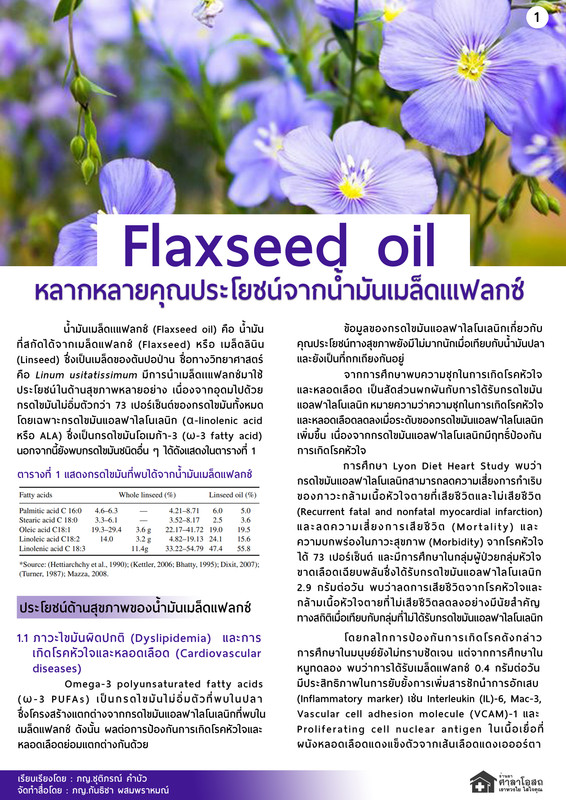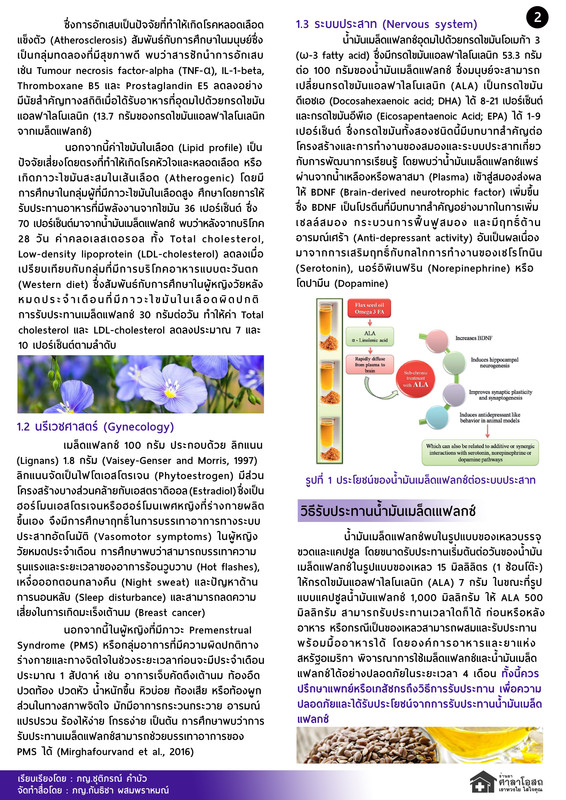2. การรับประทาน
น้ำมันแฟลกซ์พบในรูปแบบของเหลวบรรจุขวดและแคปซูล โดยขนาดรับประทานเริ่มต้นต่อวันของน้ำมันแฟลกซ์ในรูปแบบของเหลว 15 มิลลิลิตร (1 ช้อนโต๊ะ) ให้ ALA 7 กรัม ในขณะที่รูปแบบแคปซูลน้ำมันแฟลกซ์ 1,000 มิลลิกรัม ให้ ALA 500 มิลลิกรัม (แคปซูลน้ำมันแฟลกซ์แนะนำทานในขนาด 720-1,650 มิลลิกรัมต่อวัน) สามารถทานเวลาใดก็ได้ ก่อนหรือหลังอาหาร หรือกรณีเป็นของเหลวสามารถผสมและทานพร้อมมื้ออาหารได้ โดยองค์การอาหารและยาแห่งสหรัฐอเมริกา (Food and Drug Administration; FDA) พิจารณาการใช้เมล็ดแฟลกซ์และน้ำมันแฟลกซ์ได้อย่างปลอดภัยในระยะเวลา 4 เดือน
3. อันตรกิริยาระหว่างยาและเมล็ดแฟลกซ์ที่อาจเกิดขึ้น
แนะนำให้ทานน้ำมันแฟลกซ์ห่างจากยาอื่น 1-2 ชั่วโมง เนื่องจากเมล็ดแฟลกซ์อาจลดการดูดซึมยาอื่น
3.1 ยาต้านการแข็งตัวของเลือด (Anticoagulant) และยาต้านเกล็ดเลือด (Anti-platelet drugs) รวมถึงสมุนไพรและผลิตภัณฑ์เสริมอาหารที่ส่งผลกับการลดการแข็งตัวของเลือด ควรระวังการทานกับน้ำมันแฟลกซ์ เนื่องจากมีฤทธิ์ลดการแข็งตัวของเลือดเช่นกัน การทำร่วมกันอาจส่งผลให้เกิดภาวะเลือดออกผิดปกติ (Bleeding)
3.2 ยา สมุนไพร ผลิตภัณฑ์เสริมอาหารที่มีฤทธิ์ลดความดันโลหิต เนื่องจากน้ำมันแฟลกซ์มีฤทธิ์ลดความดันโลหิต จึงทำให้เกิดภาวะความดันเลือดต่ำได้
3.3 ยาลดระดับน้ำตาลในเลือด หรือยาสำหรับรักษาโรคเบาหวาน (Diabetes drugs) เนื่องจากเมล็ดแฟลกซ์มีฤทธิ์ลดระดับน้ำตาลในเลือดเช่นกัน การทานร่วมกับยา สมุนไพร หรือผลิตภัณฑ์เสริมอาหารที่มีฤทธิ์เดียวกันทำให้เกิดภาวะน้ำตาลในเลือดต่ำ
ไม่แนะนำการทานเมล็ดแฟลกซ์และน้ำมันแฟลกซ์ในหญิงตั้งครรภ์และให้นมบุตร เนื่องจากยังมีการศึกษาไม่เพียงพอ โดยน้ำมันแฟลกซ์อาจส่งผลให้คลอดก่อนกำหนด (Premature birth) เมื่อบริโภคในขณะตั้งครรภ์ไตรมาสที่ 2 และ 3
4. ผลข้างเคียงจากการทานน้ำมันแฟลกซ์
ผู้บริโภคเมล็ดแฟลกซ์และน้ำมันแฟลกซ์สามารถทนต่อผลข้างเคียงได้ดี พบการรายงานผลข้างเคียงเพียงเล็กน้อยเท่านั้น โดยรายงานส่วนใหญ่พบการแพ้เมล็ดแฟลกซ์ ผื่นขึ้นที่ฝ่ามือหรือฝ่าเท้า ผื่นลมพิษ คลื่นไส้อาเจียน ปวดท้อง ท้องเสีย เป็นต้น



เรียบเรียงโดย
ภญ.ชุติภรณ์ คำบัว
เอกสารอ้างอิง
1. Anderson LA., et al. Flax. [อินเทอร์เน็ต]. 2565. [เข้าถึงเมื่อ 8 สิงหาคม 2565]. เข้าถึงได้จาก https://www.drugs.com/npp/flax.html#fandc-np5131.b82
2. Bloedon LT, & Szapary PO. Flaxseed and cardiovascular risk. Nutrition Reviews, 2004, 62, 18–27
3. Caughey GE, Mantzioris E, Gibson RA, Cleland LG, James MJ. The effect on human tumor necrosis factor alpha and interleukin 1 beta production of diets enriched in n-3 fatty acids from vegetable oil or fish oil. Am J Clin Nutr 1996;63:116-22.
4. Chandola HM., and Ila Tanna. Role of omega-3 fatty acids in brain and neurological health with special reference to clinical depression. Omega-3 fatty acids in brain and neurological health. Academic Press, 2014. 163-179.
5. de Lorgeril M, Salen P, Martin JL, Monjaud I, Delaye J, Mamelle N. Mediterranean diet, traditional risk factors, and the rate of cardiovascular complications after myocardial infarction: Final report of the Lyon Diet Heart Study. Circulation 1999;99:779-85.
6. Désirée L. Cases in CAM: What's the Good of Flaxseed?: Commentary [อินเทอร์เน็ต]. 2551. [เข้าถึงเมื่อ 8 สิงหาคม 2565]. เข้าถึงได้จาก https://www.medscape.org/viewarticle/577044_2
7. Duran D. The Pharmacological Evaluation of Flax Seed Oil. Journal of Current Medical Research and Opinion, 2020, 3.05: 459–464.
8. Gillingham LG., et al. High-oleic rapeseed (canola) and flaxseed oils modulate serum lipids and inflammatory biomarkers in hypercholesterolaemic subjects. British Journal of Nutrition, 2011, 105.3: 417-427.
9. Ibrugger S., et al. Flaxseed dietary fiber supplements for suppression of appetite and food intake. Appetite, 2012, 58.2: 490-495.
10. Kristensen M., et al. Flaxseed dietary fibers suppress postprandial lipemia and appetite sensation in young men. Nutrition, Metabolism and Cardiovascular Diseases, 2013, 23.2: 136-143.
11. Mayo clinic staff. Flaxseed and flaxseed oil [อินเทอร์เน็ต]. 2551. [เข้าถึงเมื่อ 27 สิงหาคม 2565]. เข้าถึงได้จาก
https://www.mayoclinic.org/drugs-supplements-flaxseed-and-flaxseed-oil/art-20366457.
12. Rodriguez-Leyva D, et al. The cardiovascular effects of flaxseed and its omega-3 fatty acid, alpha-linolenic acid. Canadian Journal of Cardiology, 2010, 26.9: 489-496.
13. Singh KK., et al. Flaxseed: a potential source of food, feed and fiber. Critical reviews in food science and nutrition, 2011, 51.3: 210-222.
14. Sourinejad H, et al. The use of flaxseed in gynecology: a review article. Journal of Midwifery and Reproductive Health, 2019, 7.2: 1691-1711.
15. Struijs K. The lignan macromolecule from flaxseed: structure and bioconversion of lignans. Wageningen University and Research, 2008.
16. University of Montreal. Pregnant Women Consuming Flaxseed Oil Have High Risk Of Premature Birth [อินเทอร์เน็ต]. 2551. [เข้าถึงเมื่อ 8 สิงหาคม 2565]. เข้าถึงได้จาก
http://www.sciencedaily.com/releases/2008/10/081027140817.htm.
17. Vaisey-Genser M and Morris DH. Flaxseed: health, nutrition and functionality. Winnipeg, MB: Flax Council of Canada, 1997.
